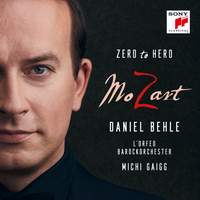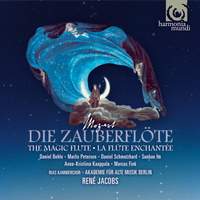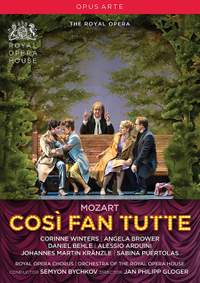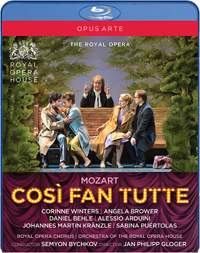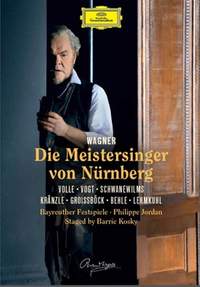Interview,
Daniel Behle on Zero to Hero
 I first came across the German tenor Daniel Behle back in 2010, as a fresh-voiced but unusually assertive Tamino on René Jacobs’s award-winning recording of Die Zauberflöte, and remember wondering at the time whether he might eventually transition into Beethoven and the more lyric Wagner roles further down the line. Nine years on, he has role-debuts as Florestan and Lohengrin scheduled for the 2019/2020 season as well as all of the major Mozart roles securely under his belt, as his new album MoZart: Zero to Hero (released last week on Sony) attests.
I first came across the German tenor Daniel Behle back in 2010, as a fresh-voiced but unusually assertive Tamino on René Jacobs’s award-winning recording of Die Zauberflöte, and remember wondering at the time whether he might eventually transition into Beethoven and the more lyric Wagner roles further down the line. Nine years on, he has role-debuts as Florestan and Lohengrin scheduled for the 2019/2020 season as well as all of the major Mozart roles securely under his belt, as his new album MoZart: Zero to Hero (released last week on Sony) attests.
I met up with Daniel just after he arrived in London (fresh from singing Walther in Tannhäuser and David in Die Meistersinger at Bayreuth) for the Royal Opera House’s Don Giovanni to chat about how he organised the programme, Mozart’s depictions of masculinity, and how he’s balancing his ongoing Belmontes and Ottavios with the Romantic heroic repertoire that figures in his immediate future…
Mozart's been really central to your career from the beginning, but how did you come up with the concept of 'Zero to Hero'?
The album brings together all the Mozart roles I’ve done so far and also traces the development of Mozart’s writing for tenor, moving from pure lyric roles towards the heroic ones like Tito and Idomeneo. (The aria from Betulia liberata falls into the heroic category too, although it’s a really early work; it’s also a link to my next album, Kings of Bravura, which will explore Mozart’s teachers and influences). That trajectory also mirrors the journey of the lyric tenor, if things work out: the lyrical approach, I think, is always the right one, so it should also work for the more heroic repertoire that tends to come later on in a singer's career.
I wanted to shine a light on how Mozart explores masculine behaviour, whether it’s heroic or childlike. Of course Mozart’s all about complexity, and his heroes are rarely just one or the other: for instance, is Tamino a young prince or is he an experienced one? I'm inclined to think he's young: like Schubert’s protagonist in Die schöne Mūllerin, he’s full of ideals about love and about how the world should be, and that’s also true of Ferrando in Così fan tutte (who I think is probably the most psychologically complex of all these characters).
The journey from ‘Zero to Hero’ starts off with Don Ottavio, which you’re singing at Covent Garden at the moment – do you see him as the least heroic of Mozart’s tenor roles?
It’s perhaps a bit harsh to see Ottavio as ‘zero’ in the sense of ‘complete loser’, but he’s not exactly heroic in terms of getting stuff done: in a way he behaves impeccably, but ultimately this behaviour doesn’t bring him Donna Anna, so in that regard he literally is a loser. Ottavio is a sort of Everyman in that he’s probably the most relatable character on the album and in the opera: most people would react and behave as he does because they respect certain social boundaries, whereas Don Giovanni (who doesn’t) is the person everybody wants to be...But they don't want to face the consequences of acting as he does, so they don't!
Although most of the arias here are very much part of the mainstream repertoire, the album includes a fair amount of music which is rarely heard in the opera-house these days...
Yes: Ferrando’s Act Two aria Ah lo veggio is almost always cut in productions, and the long version of Wenn der Freude Tränen fliessen from Die Entführung is hardly ever done on stage either (I think there’s only one other recording, and that was made a long time ago). I’ve also gone for the original version of Idomeneo’s Fuor del mar, with the long cadenzas.
Do you have strong feelings about this material being cut in staged productions?
It depends: it's all wonderful music, but in terms of the arc of the characters some of these arias are more dispensable than others. In Così fan tutte, for instance, we still get a clear, well-rounded sense of Ferrando’s character even if he loses that aria, but in Don Giovanni things are more complicated because Mozart wrote different arias for the Prague and Viennese premieres: if you do the Vienna version [with just Dalla sua pace] you have a relatively weak Ottavio; if you do the Prague version [with just Il mio tesoro] somehow he’s not present enough in the first act. When I got this engagement I asked Peter Katona [Director of Casting at the Royal Opera House] if it would be possible to have both arias, and he agreed; for me it’s always interesting to show both faces of the coin.
Singing Tamino on René Jacobs’s Zauberflöte was one of your first big breaks recording-wise…Does it feel very different vocally these days?
Dies Bildnis is really one of those arias which you grow with throughout your whole life; it’s such a touchstone for a lyric tenor, and it’s also relatively heavy. It’s ten years since the Jacobs recording, which we really approached like an audio-book in terms of fitting the singing around the dialogue rather than the other way round, and it’s been great to have the opportunity to record it again after doing so many different productions of Zauberflöte in the interim. I think the version on this album is more experienced: this time round I felt able to explore more of its interpretative possibilities, through playing with the sotto voce and portamento and having the confidence to do what Fritz Wunderlich did in terms of giving less sound but really focusing on the purity of the line.
Would you count Wunderlich as one of your main inspirations when it comes to this repertoire?
Of course: I think everybody who sings Mozart listens to Wunderlich and desperately wants to grasp how he did it! I would never try to outright copy him, because I have another timbre and also a certain idea of how this repertoire should be sung today: vocal style was very different in the 1950s and 60s, and Wunderlich was a man with a very distinct sense of how this music should be done. And of course the sort of staged productions we do today are nothing like the kind of thing you saw in Wunderlich’s time; but the beauty of doing a recording like this is that you really have the space to aim for the sort of clarity that he achieved and to get everything as close to perfection as possible from a vocal point of view, whilst hopefully bringing your stage experience to bear on the music as well. For this recording I had the luxury of five days with this great orchestra (and a native Italian teacher on hand to give me advice!) in a very inspiring environment; we recorded in Zell an der Pram, which is near Linz and Vienna, and the venue itself is an old monastery that’s been rebuilt with a very nice concert-hall in the middle. We recorded the Schubert arias album there too.
Have you been involved in any productions which have fundamentally changed the way you think about these characters?
I still think that the CD ‘production’ (and I do think of it as a ‘production’!) of Zauberflöte with René was the most interesting for me: he knew so exactly what this opera was meant to be, and he communicated that so clearly that everyone else has a pretty hard time to convince me otherwise! But I must say that I also really loved doing the old August Everding staging which Munich Opera took to Japan a couple of years ago: the show’s been around for forty years, but it’s a really lovely production, with the Queen of the Night appearing in the moon and lots of grass and trees and an old cemetery as part of the set. The Japanese were so kind and welcoming, as they absolutely love this music in this sort of production, and after doing so many more radical stagings it was such an interesting experience for me.
You seem to be following a similar path to Klaus Florian Vogt, who sang Walther to your David in Bayreuth’s Meistersinger just after recording Zauberflöte for Yannick Nézet-Séguin last summer: do the pair of you compare notes on switching between Mozart and Wagner?
Klaus Florian’s a very quiet man, and when we talk it’s almost never about the profession: in fact it’s very often about flying, because as well as being a fine singer he’s also a very good pilot! He has his own plane which he flies into Bayreuth for the season, and he’ll go off on trips when we have rest-days. But yes, I do like to bring this repertoire together in the same way that he does: I have my contracts for Mozart roles through to the 22/23 season, so balancing that with the Lohengrins and Florestans will be a really exciting challenge. I prefer to think of this repertoire as 'heroic' rather than 'heavy', because I think the concept of vocal weight is so often misinterpreted and misunderstood: does describing a voice as 'heavy' imply problems with air-flow, or loss of the capacity to produce a beautiful pianissimo sound? Because to me the ability to sing tenderly and with a real sense of line is as crucial for Wagner as it is for Mozart, and I hope Lohengrin will give me the opportunity to show that: you have everything from heroic moments to incredible sweetness and intimacy, and for a lot of the time the chorus is supporting you. (In a sense, singing Walther in Tannhäuser is actually more tiring, because you're doubling with the chorus so much and having to sustain long notes in the passaggio; with Lohengrin at least you're singing above the choral texture on your own, which is generally much easier!).
Everybody’s looking for a Lohengrin because the music’s so incredible and it’s not very easy to find a voice which fits everything that’s in there, and so I hope I can open up new possibilities in terms of how it can be sung. You don’t just have to sing Wagner: you have to live with it and still be able to do your other repertoire when you come out on the other side, so I have to bring Lohengrin to a point where I can sing a run of performances and still get up and do Winterreise the next day.
Daniel Behle is currently singing Don Ottavio in Kasper Holten's production of Don Giovanni at the Royal Opera House Covent Garden, which also stars Erwin Schrott in the title-role and British soprano Louise Alder in her house debut as Zerlina; the run ends on Tuesday 8th October.
Daniel Behle (tenor), L'Orfeo Barockorchester, Michi Gaigg
Available Formats: CD, MP3, FLAC, Hi-Res FLAC
Related Recordings
Daniel Behle (Tamino), Marlis Petersen (Pamina), Daniel Schmutzhard (Papageno), Sunhae Im (Papagena), Anna-Kristiina Kaappola (Königin der Nacht), Marcos Fink (Sarastro), Kurt Azesberger (Monostatos)
Akademie für Alte Musik Berlin, René Jacobs
Available Formats: MP3, FLAC, Hi-Res FLAC
Corinne Winters (Fiordiligi), Angela Brower (Dorabella), Daniel Behle (Ferrando), Alessio Arduini (Guglielmo), Johannes Martin Kränzle (Don Alfonso), Sabina Puertolas (Despina)
Orchestra and Chorus of the Royal Opera House, Semyon Bychkov, Jan Philipp Gloger
Available Format: DVD Video
Corinne Winters (Fiordiligi), Angela Brower (Dorabella), Daniel Behle (Ferrando), Alessio Arduini (Guglielmo), Johannes Martin Kränzle (Don Alfonso), Sabina Puertolas (Despina)
Orchestra and Chorus of the Royal Opera House, Semyon Bychkov, Jan Philipp Gloger
Available Format: Blu-ray
Daniel Behle sings David in Barrie Kosky's new production of Die Meistersinger, filmed at the Bayreuth Festival last summer; the cast also includes Michael Volle as Hans Sachs, Klaus Florian Vogt as Walther von Stolzing, Anne Schwanewilms as Eva, and Johannes Martin Kränzle as Beckmesser.
Available Format: 2 DVD Videos


